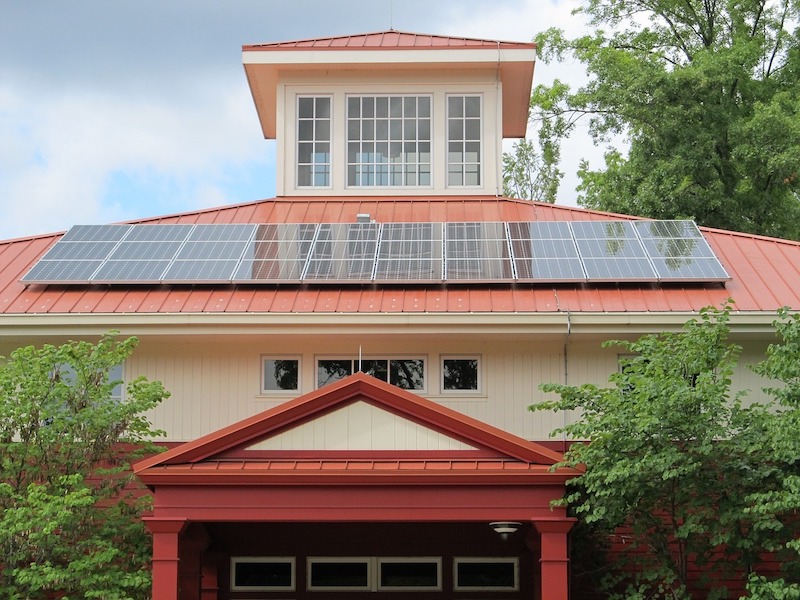The U.S. Department of Commerce tentatively agreed to assess tariffs of up to 35% on solar equipment, a move that could slow the rapid growth of the domestic solar power industry. SolarWorld, a German company with a U.S. base is in Oregon, requested the tariffs, claiming China unfairly subsidizes its solar manufacturers.
Solar panel installers, on the other hand, are opposed to tariffs. These companies have boomed as panel prices have fallen 70 percent since the start of 2010. Tariffs, they say, will make solar power less affordable.
SolarWorld made a similar complaint to U.S. trade officials in 2011. The next year, the Commerce Department imposed duties averaging 31% on Chinese solar cells. Many Chinese companies responded by taking cells made in other countries, assembling them into panels in China, and shipping them to the U.S. to sidestep the tariffs.
Many solar power industry insiders are holding out hope that SolarWorld and the Chinese can work out a settlement.
(http://www.sfgate.com/business/article/Tariffs-could-dim-solar-energy-s-rapid-growth-5538030.php)
Related Stories
Resiliency | Sep 3, 2024
Phius introduces retrofit standard for more resilient buildings
Phius recently released, REVIVE 2024, a retrofit standard for more resilient buildings. The standard focuses on resilience against grid outages by ensuring structures remain habitable for at least a week during extreme weather events.
Adaptive Reuse | Aug 28, 2024
Cities in Washington State will offer tax breaks for office-to-residential conversions
A law passed earlier this year by the Washington State Legislature allows developers to defer sales and use taxes if they convert existing structures, including office buildings, into affordable housing.
Adaptive Reuse | Aug 22, 2024
6 key fire and life safety considerations for office-to-residential conversions
Office-to-residential conversions may be fraught with fire and life safety challenges, from egress requirements to fire protection system gaps. Here are six important considerations to consider.
Building Materials | Aug 19, 2024
Federal 'buy clean' construction materials label program unveiled
The U.S. Environmental Protection Agency announced a plan for implementing a new label program to boost American production of more climate-friendly construction materials and products. The label program will prioritize steel, glass, asphalt and concrete.
Reconstruction & Renovation | Aug 19, 2024
Movement to protect historic buildings raises sharp criticism
While the movement to preserve historic buildings has widespread support, it also has some sharp critics with well-funded opposition groups springing up in recent years. Some opponents are linked to the Stand Together Foundation, founded and bankrolled by the Koch family’s conservative philanthropic organization, according to a column in Governing magazine.
Government Buildings | Aug 19, 2024
GSA posts new RFI for enabling energy efficiency, decarbonization in commercial buildings
The U.S. General Services Administration (GSA), in collaboration with the U.S. Department of Energy, recently released a new Request For Information (RFI) focused on enabling energy efficiency and decarbonization in commercial buildings. GSA wants to test innovative technologies through GSA’s Center for Emerging Building Technologies.
Urban Planning | Aug 15, 2024
New York City begins first large-scale porous pavement installation
New York City is installing its first large-scale porous pavement installation along seven miles of roadway in Brooklyn. The project will keep 35 million gallons of stormwater out of the combined sewer system each year, according to a news release.
Government Buildings | Aug 14, 2024
GSA releases updated standards to move federal buildings toward zero emissions
The U.S. General Services Administration (GSA) recently released updated building efficiency standards for federal buildings. The mandatory design and construction standards and performance criteria apply to 300,000 federal buildings.
MFPRO+ News | Aug 14, 2024
Report outlines how Atlanta can collaborate with private sector to spur more housing construction
A report by an Urban Land Institute’s Advisory Services panel, commissioned by the city’s housing authority, Atlanta Housing (AH), offered ways the city could collaborate with developers to spur more housing construction.
Energy Efficiency | Aug 9, 2024
Artificial intelligence could help reduce energy consumption by as much as 40% by 2050
Artificial intelligence could help U.S. buildings to significantly reduce energy consumption and carbon emissions, according to a paper by researchers at the Lawrence Berkeley National Laboratory.

















